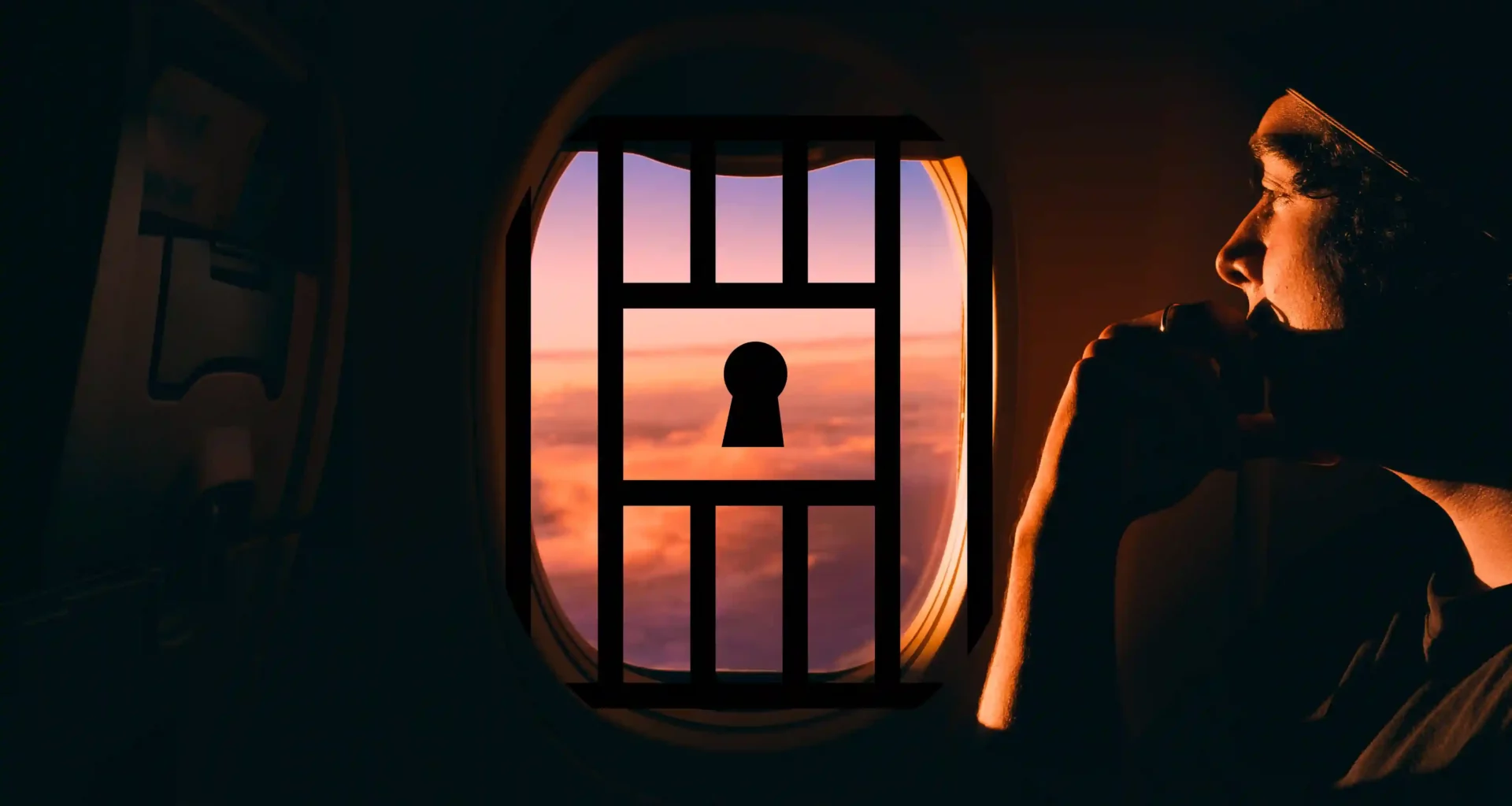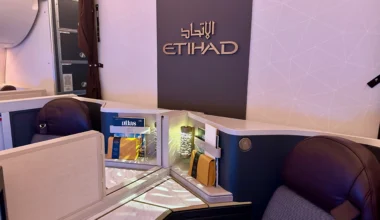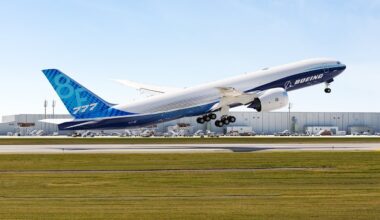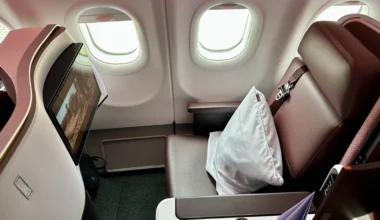Although nobody can explain exactly why, incidences of verbal abuse, physical abuse, and noncompliance have skyrocketed on planes since 2019. I’ve written about many of them. This behavior, euphemistically called “unruly passenger conduct,” can result in extremely costly diversions and a whole lot of inconvenience for other passengers.
A testament to our collective annoyance over all this are the drastic (though mostly humorous) solutions I’ve heard for dealing with the problem. Several online commenters have suggested cabin crew begin throwing unruly passengers out of aircraft at 10,000 feet (the altitude at which cabin doors can be opened), while others have suggested wrapping them up in blankets and bundling them into the cargo hold.
One suggestion piqued my interest: install a small jail or “brig” on planes in which to temporarily detain unruly passengers.
In theory, it’s not such a bad idea. After all, it could mean that instead of having to make expensive diversions, cabin crew could put someone in a sort of airplane prison for the remainder of the flight where they’d no longer be a danger to other passengers. Cruise ships have brigs in case staff need to detain passengers and, though rarely used, are all the more safe for having them.
How I’ll answer the question
I’d like to answer the question of whether or not an onboard brig makes sense. I’m looking at the question from an economic perspective, not because the ethical or legal considerations are unimportant, but because figuring out whether airplane prisons make financial sense is a lot less subjective than figuring out whether it makes ethical sense.
In other words, instead of speculating about the deterrent effects of a brig or ethical considerations or other hard-to-quantify benefits and costs, I want to answer a simple question: would an onboard detention area cost more or less than the diversions it could prevent or minimize?
Because it’s easier to get data for specific airlines than the industry as a whole, I’ve used Delta as an example in this article. You could, however, use the same equations and logic to figure out the cost of unruly passenger behavior for other airlines or for the entire industry.
Bad behavior on airplanes is increasing
First, let’s take a look at the trajectory and scope of the problem in the past few years. According to recent data released by the International Air Transport Association (IATA), incidents of unruly passenger behavior rose 47% globally in the last year, increasing from one incident per 835 flights to one per 568. These incidences began increasing during Covid but have persisted even as the pandemic and related restrictions have disappeared.
IATA’s analysis of more than 20,000 reports submitted by around 40 airlines worldwide identified non-compliance with crew instructions, verbal abuse, and intoxication as the most common types of unruly conduct. In the US, FAA data show a similar trend.
The cost of diversions caused by unruly passengers
The cost of a diversion incurred by an airline depends on a bunch of things, including how far out of its way a plane has to go, whether it needs to dump fuel, landing fees, whether the airline needs to provide passengers accommodation and food, and so on. Chris Smith, partner at the Air Law Firm in London, said the cost of diverting a flight to deal with a passenger’s behavior typically ranges from $15,000 to $100,000 depending on these factors.
For the sake of the exercise, then, let’s assume that the average cost of a diversion is about $60,000. If we take an airline like Delta, which operates around 1.5 million flights a year, we might expect around 2,600 reports of unruly passengers. Only about 10% of unruly passengers cause diversions, though, so we can assume that Delta will need to divert planes for this reason about 260 times a year. With an average cost of $60,000 per diversion, that amounts to an annual cost of about $15.6 million. In other words:
Or, with actual numbers:
That’s a lot of money! Let’s assume, though, that airline jails won’t prevent all diversions, and that about 25% of the time, the flight will still divert for one reason or another–perhaps the pilots on a flight from Newark to Beijing land in Chicago out of pity for an offending passenger they don’t want to see rot in a Chinese prison. Let’s also assume that, in about 5% of cases, according to Chris Smith at the Air Law Firm, airlines can recover the cost of a diversion from the unruly passenger. That means that the actual savings that Delta might realize in any given year is about 75% of $15.6 million, or $11.7 million.
There we have: in the case of Delta Air Lines, I estimate that diversions due to unruly passengers cost around $15 million every year and that an onboard brig could prevent around $12 million of those costs.
The cost of jails on airplanes
According to our estimates, diversions cost Delta a pretty penny, but that still doesn’t mean a brig makes financial sense. To figure that out, we need to figure out how much extra Delta would need to spend on its brigs. I’ll break this down into two costs: initial installation and lost ticket revenue.
I’m going to ignore the cost of additional fuel burn from any added weight as well as maintenance and upkeep costs. Mostly, I’m going to do this because they’re tiny relative to the cost of installation and lost ticket revenue. Given the infrequency of a brig’s use, I just can’t imagine maintenance being much more expensive than what an airline would pay to maintain the seats it had replaced. Likewise, weight gains resulting in additional fuel consumption, though hard to estimate, likely wouldn’t be much considering the airline has removed four seats.
Installation
Since I wasn’t able to get on the phone to anyone willing to install a brig on a commercial airline, I’ll use the cost of a first class suite as an analog. According to what I’ve read, these can cost anywhere between $100,000 and $500,000 per seat, a cost that accounts for design, materials, labor, and certification. Let’s assume that a brig would cost around as much as the most expensive first class seats—think something like the fully-enclosed Emirates first class suite. Obviously, the materials used for a brig would be considerably less luxurious, but the certification and development costs would be substantial. And because there would only be one per plane, this cost won’t be spread across many brigs.
Delta’s fleet comprises slightly fewer than 1000 planes. That means that the total cost of installation across the entire fleet would be around $500 million. This would be an upfront cost but, if we spread it out (or “amortize,” in accounting language) over the life of an average Delta aircraft, about 15 years, the installation would cost about $33 million per year. In other words:
Or, with actual numbers:
Lost revenue
If we assume that a brig takes up the equivalent space of four economy class seats, then we need to calculate the potential lost revenue from not selling those four seats. This would be the ticket price for those seats multiplied by the load factor, which is the number of seats actually sold divided by the number of total seats.
I scraped Google Flights data to find that the average cost of a roundtrip economy class ticket on Delta right now is about $550. Prices during the summer, though, are higher than the rest of the year, so I’m going to bring that down to a $500 average ticket price throughout the whole year. If we multiply that by four and then again by 84% (Delta’s average load factor in 2022), we get potential lost revenue of about $1680. Divide that by two and we get the potential lost revenue for an average flight of $840.
Delta operates just shy of 1.5 million flights per year, so by multiplying $840 by 1.5 million, we get the total potential lost revenue from installing a brig on all its planes, a staggering $730 million. In other words:
Or, with actual numbers:
In sum, I estimate that putting jails on all their aircraft would cost Delta around $33 million in amortized installation costs and $730 million in lost ticket revenue, for a total cost of $766 million per year.
Verdict: it is absolutely not financially viable to put brigs on airplanes
Okay, so here’s what we’ve worked out. Diversions due to unruly passengers cost Delta about $15 million every year. Airplane jails, which could theoretically lower those costs by about $12 million, would cost a whopping $766 million every year in amortized installation costs and lost ticket revenue. In other words, the proposed solution would cost around 60 times the problem it’s supposed to solve.
From a financial perspective, putting jails on airplanes to solve the problem of unruly passengers is a bit like addressing a termite infestation by dropping a nuclear warhead on one’s home.
Alternative solutions
Though a brig is clearly overkill, the cost of unruly passenger behavior is not insignificant. Using the above methodology, unruly passengers caused diversions costing airlines around $228 million in 2022, given there were about 22 million commercial flights that year.
Preventative measures such as stricter boarding policies and increased penalties for disruptive behavior (the FAA has already introduced higher fines for disruptive passengers, with penalties reaching up to $35,000) could potentially reduce the incidence of in-flight misconduct and diversions for a fraction of the cost of airplane jails. Given that a 2020 IATA report noted that intoxication was a factor in 23% of unruly passenger cases, limited onboard alcohol may also be a constructive measure.
Conclusion
Although this exercise is partially tongue-in-cheek, I think it might be valuable in figuring out cost-effective solutions to the scourge of unruly passenger conduct. Jails on planes are an absolutely terrible idea (and not just financially–there’s a litany of ethical, practical, and legal reasons why as well), and the industry should focus on more viable options such as enforcing stricter boarding policies, further increasing penalties for disruptive behavior, and limiting onboard alcohol.
Though I hate to end on a negative note, a burgeoning culture of disrespect and selfishness among passengers may be to blame here. Sadly, that’s a root cause that no number of FAA or airline policies can solve.







7 comments
It’s so sad that ours flights ✈ Attendant are getting hurts 😢! It’s sorrowful that the government It’s not doing enough to stop those aggressive people inside the planes 😢! It’s scary to fly from now on😥! Those hard working ladies as flights ✈ Attendant are valuable very special on the air. We should write to the Congress to do something about that scary 😨 situation. It need to stop and pay more respects for those mademoiselle lovely and respectful professionals flights ✈ Attendant. Chris
Airlines should have passengers put up a credit card in advance for incidentals like hotels do. If the passenger is not unruly, nothing is billed to the credit card. If the passenger is unruly, the airline should charge the credit card an amount commensurate with the infraction.
I think there might be a less expensive way to create a “brig” on an aircraft. This would be to equip one Lav on aircraft with a minimum of 3 Lavs as the official brig. Of course this does add some inconvenience to the passengers but presumably it would represent less of an inconvenience then diverting the flight.
Of course, you didn’t cover the legal aspects of jailing a passenger – unless there is a duly sworn law enforcement officer (or flight attendants are deputized, which would be a long shot) on board to carry out the arrest and imprisonment, there would be a multitude of legal/civil rights issues: potential kidnapping, illegal imprisonment, no reading of civil rights, the list goes on and on! Even a “citizen’s arrest” with adequate Miranda warning would likely not allow imprisonment – perhaps detainment in a seat… So, in addition to the potential cost/benefit analysis, one would have to factor in the cost of a future law suit of the imprisoned passenger… Not that I’m advocating for unruly and obnoxious passengers, I’m not – think they’re despicable and should be jailed! but… just pointing out the legal aspects… And no, I’m not an attorney (Heaven forbid) – I dropped out of law school after one year one because I came to my senses (apologies to any lawyers reading this)…
Nice article, but totally oriented to what that poor airline, Delta, suffers from unruly passengers. O woe, o woe. You do not give a tinker’s dam about the passengers, though. What about those delays, returns to to point of departure and the associated hotel rooms lost, meetings missed, and so on. In short, what about us?
Solutions:
1. A diversion results in that passenger being permanently barred from all airline travel in that country.
2. The airline sues the passenger to recover the cost of the diversion.
3. Any (and hopefully all) passengers who incurs financial costs due to the diversion sues that passenger (this is what small claims court is for).
I totally agree on the first point, but airlines and insurance companies already try to recover costs and rarely succeed, so I’m not sure that’s an effective deterrent.